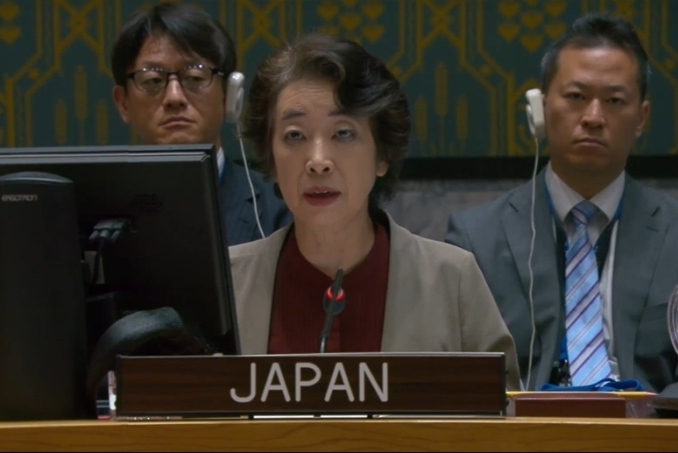Statement by H.E. Ambassador SHINO Mitsuko, Deputy Permanent Representative of Japan to the United Nations, at the United Nations Security Council Briefing on Syria’s Political & Humanitarian Situation
2024/8/28

(As delivered)
I thank Special Envoy Pedersen and ASG Musya for their informative briefings.
The Syrian crisis, now in its 14th year, shows no signs of abating. The humanitarian situation is worsening. 6 million Syrians remain refugees, 7 million are IDPs, and more than 70% are in dire need of assistance.
Economic hardship is leading many young people to leave the country, while others resort to militancy or illicit activities. They cannot afford to wait year after year for a political solution that is nowhere in sight.
It is also deeply alarming that many civilian lives are being lost to armed clashes and an increased number of terrorist attacks by ISIL.
Given all of this, I would like to make three points today.
First, the Middle East is now full of sparks, any one of which could set the region aflame, as highlighted by the exchange of fire across the Blue Line over the weekend. To prevent this, we need to address the biggest flashpoint. Namely, we must minimize the impact of the Gaza conflict on Syria.
This requires a lasting ceasefire in Gaza without delay. Regional stability is necessary for Syrian stability, and vice versa. If Syria is drawn into a regional conflict, it could further destabilize the country and trigger new violence. We must lose no time to extinguish the sparks and lower regional tensions.
Second, it is essential to support the Syrian-led and Syrian-owned political process facilitated by the UN under Security Council resolution 2254.
Even though the Constitutional Committee may not be fundamentally resolving the Syrian crisis, it still offers the best path to a lasting political solution.
In this vein, we strongly support the role of Special Envoy Pedersen and his efforts to address all conflict-related issues, including the resumption of the Constitutional Committee, through a comprehensive approach.
Yet more than two precious years have been lost over the question of venue. Both the Syrian government and the opposition must set aside narrow interests for the long-term future of the country.
Likewise, it will be difficult to achieve a major political breakthrough without rebuilding mutual trust between the Syrian government and key stakeholders.
Japan believes that the key is “engagement and dialogue”. In this regard, we are aware of ongoing efforts to rebuild diplomatic relations between the Syrian and Turkish governments, and these positive efforts must continue.
Third, cross-border assistance from Turkiye remains a vital lifeline to northwest Syria. While we welcome the Syrian government’s decision to extend the UN’s use of the Bab al-Salam and al-Ra'ee border crossings for an additional three months, we call for a longer extension from the perspective of predictability.
However, the need for aid is nationwide. Even in Damascus, electricity shortages are severe, and many people require urgent assistance.
While humanitarian needs throughout Syria are at an all-time high, funding is at an all-time low. Therefore, the humanitarian response to Syria must be conducted more efficiently than ever before.
It is critically important for the international community to support the livelihoods and living conditions of the Syrian people through early recovery and resilience assistance with medium- to long-term impact in areas such as education, healthcare, water, and electricity.
In this regard, we strongly support the UN-led development of an early recovery strategy and the creation of an Early Recovery Trust Fund. Japan, as a major donor, will continue to extend its hand to the Syrian people.
Finally, Japan will continue its "engagement and dialogue" with the Syrian government and key stakeholders and will make utmost efforts as a responsible Security Council member toward a sustainable resolution of the Syrian crisis, in accordance with resolution 2254.
I thank you, Mr. President.
